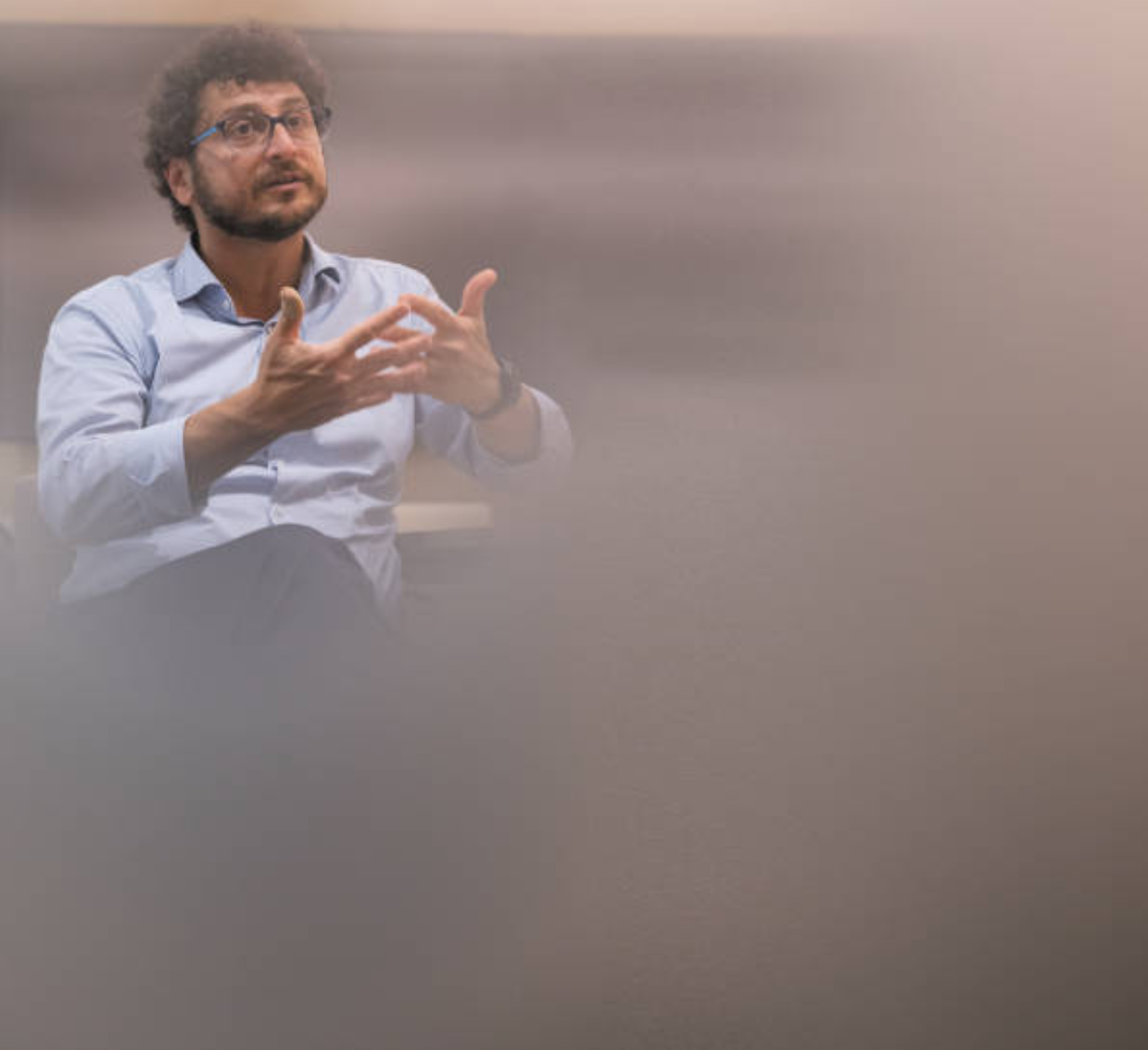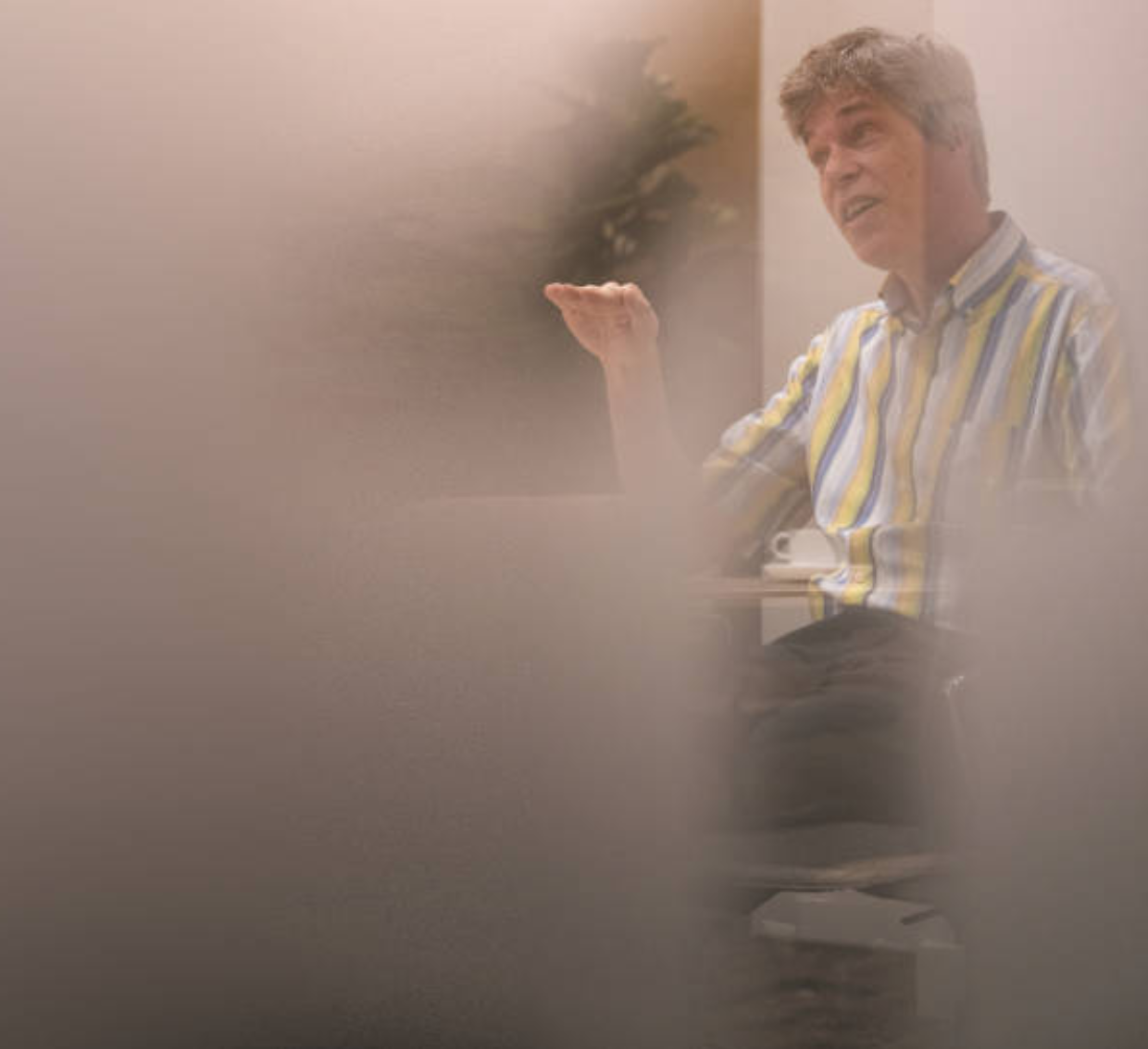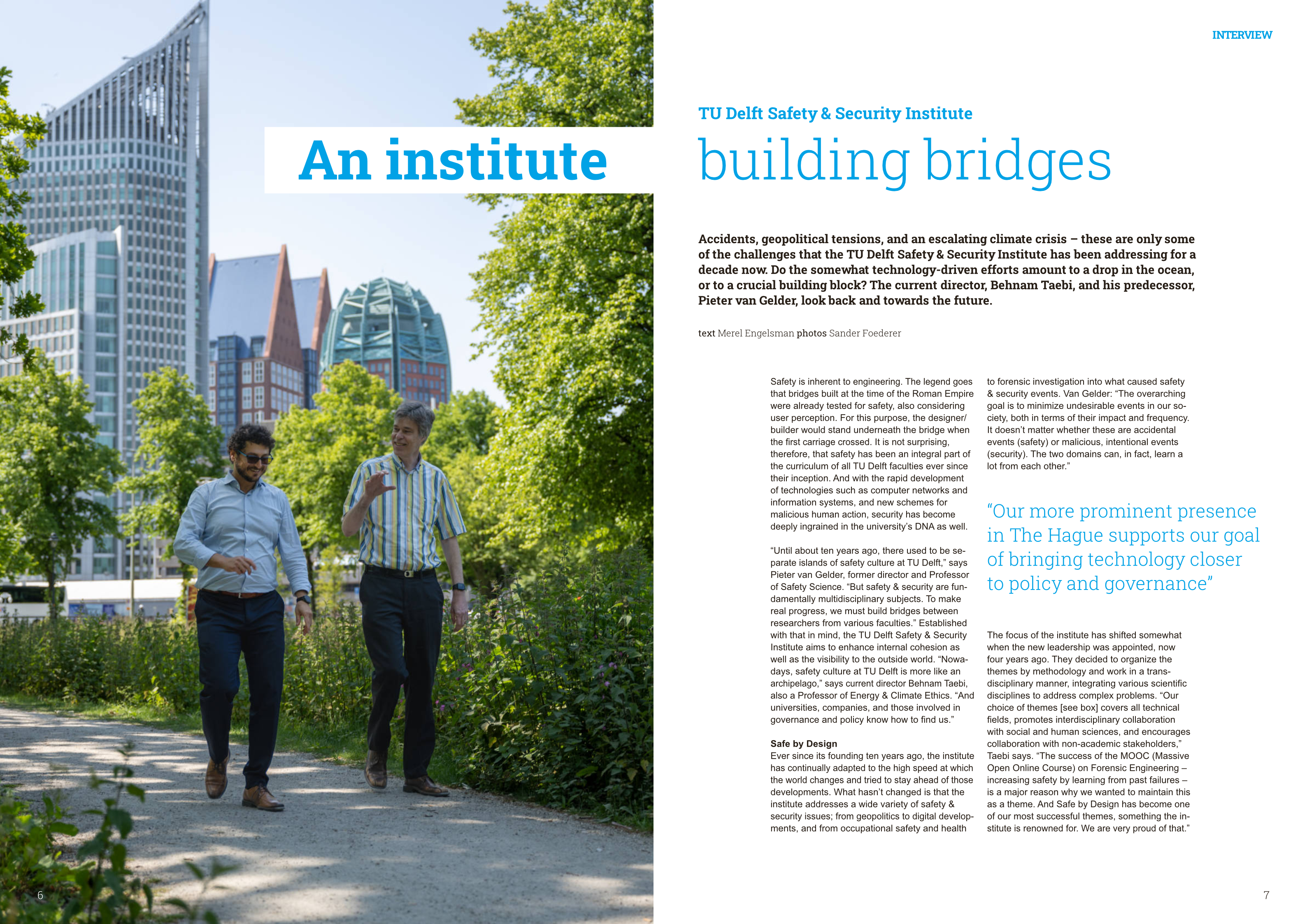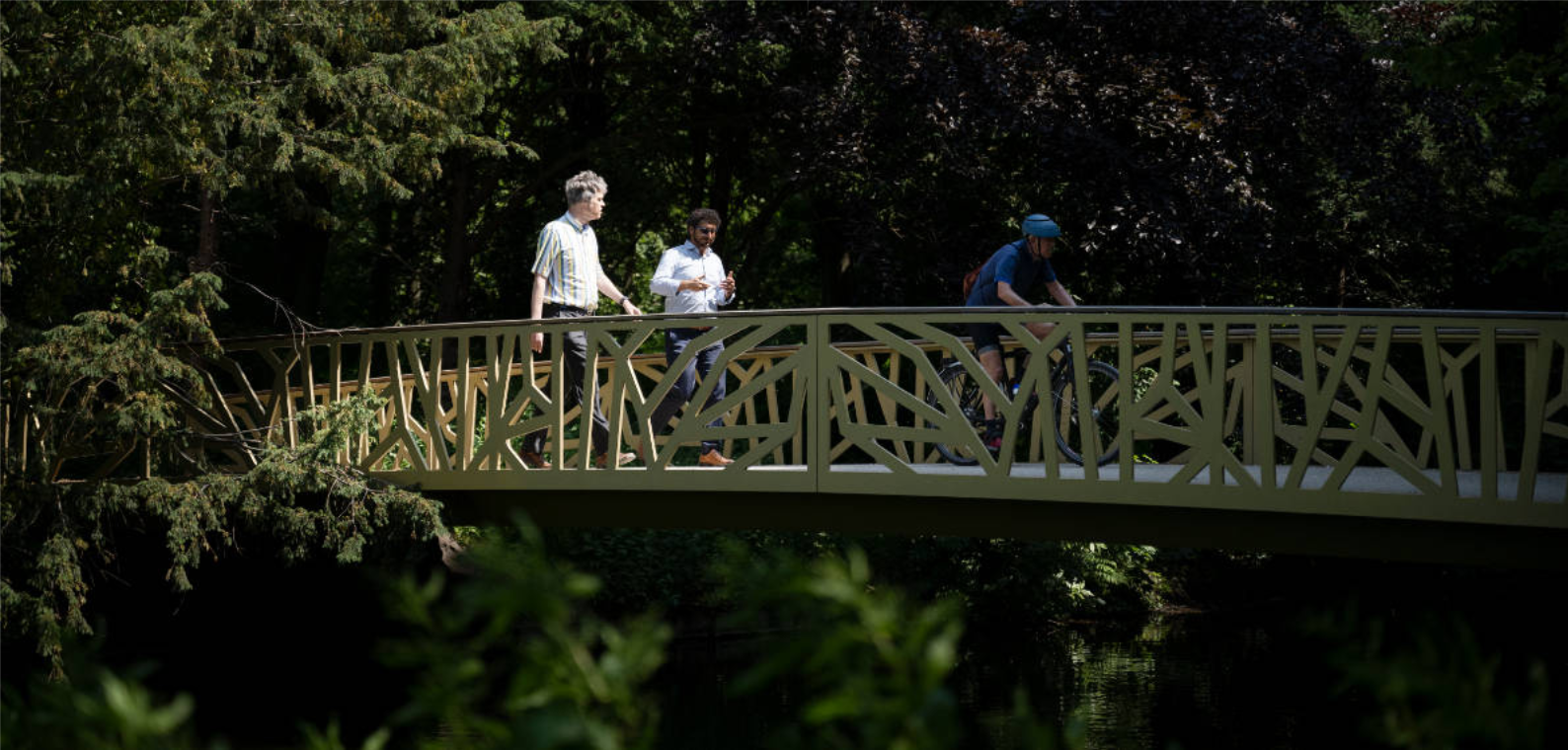TU Delft Safety & Security Institute – An Institute Building Bridges
An interview with Behnam Taebi and Pieter van Gelder
Accidents, geopolitical tensions, and an escalating climate crisis – these are only some of the challenges that the TU Delft Safety & Security Institute has been addressing for a decade now. Do the somewhat technology-driven efforts amount to a drop in the ocean, or to a crucial building block? The current director, Behnam Taebi, and his predecessor, Pieter van Gelder, look back and towards the future.
text Merel Engelsman photos Sander Foederer
Safety is inherent to engineering. The legend goes that bridges built at the time of the Roman Empire were already tested for safety, also considering user perception. For this purpose, the designer/ builder would stand underneath the bridge when the first carriage crossed. It is not surprising, therefore, that safety has been an integral part of the curriculum of all TU Delft faculties ever since their inception. And with the rapid development of technologies such as computer networks and information systems, and new schemes for malicious human action, security has become deeply ingrained in the university’s DNA as well.
“Until about ten years ago, there used to be separate islands of safety culture at TU Delft,” says Pieter van Gelder, former director and Professor of Safety Science. “But safety & security are fundamentally multidisciplinary subjects. To make real progress, we must build bridges between researchers from various faculties.” Established with that in mind, the TU Delft Safety & Security Institute aims to enhance internal cohesion as well as the visibility to the outside world. “Nowadays, safety culture at TU Delft is more like an archipelago,” says current director Behnam Taebi, also a Professor of Energy & Climate Ethics. “And universities, companies, and those involved in governance and policy know how to find us.”
Safe by Design
Ever since its founding ten years ago, the institute has continually adapted to the high speed at which the world changes and tried to stay ahead of those developments. What hasn’t changed is that the institute addresses a wide variety of safety & security issues; from geopolitics to digital developments, and from occupational safety and health to forensic investigation into what caused safety & security events. Van Gelder: “The overarching goal is to minimize undesirable events in our society, both in terms of their impact and frequency. It doesn’t matter whether these are accidental events (safety) or malicious, intentional events (security). The two domains can, in fact, learn a lot from each other.”
Our more prominent presence in The Hague supports our goal of bringing technology closer to policy and governance
The focus of the institute has shifted somewhat when the new leadership was appointed, now four years ago. They decided to organize the themes by methodology and work in a transdisciplinary manner, integrating various scientific disciplines to address complex problems. “Our choice of themes [see box] covers all technical fields, promotes interdisciplinary collaboration with social and human sciences, and encourages collaboration with non-academic stakeholders,” Taebi says. “The success of the MOOC (Massive Open Online Course) on Forensic Engineering – increasing safety by learning from past failures – is a major reason why we wanted to maintain this as a theme. And Safe by Design has become one of our most successful themes, something the institute is renowned for. We are very proud of that.”
The human dimension
Both directors emphasize that research into safety & security at TU Delft may not be that different from other universities. “We tend to lean towards technological approaches,” Taebi says. “But above all, we see ourselves as part of a larger safety & security family.” An essential, as promoting safety & security requires a combination of technical, social, and humanistic knowledge. It is impressive, for instance, that airplanes can fly and land on autopilot, but sometimes a pilot needs to suddenly intervene after many minutes of inactivity. Taebi: “A lapse in attention and the socio-technical solutions to prevent this from happening are of major importance for self-driving cars. It can help prevent many unsafe situations and accidents. Additionally, TU Delft has made great effort to formally investigate safety cultures – in the cockpit of an aircraft, in the chemical industry, and in healthcare.”
There are certainly topics at which TU Delft excels precisely because of its technological perspective – such as the probabilistic approach to safety & security. Van Gelder: “It is hard to underestimate the importance of this mathematical way of thinking. When it comes to flood safety, for example, you could even speak of a “Delft approach”. But it does not define us as we have significantly broadened our scope. Ethical aspects of safety & security are just as important to us. What exactly is safety, and how does it relate to other values that we as society consider important? Are safety risks distributed fairly, and who bears formal responsibility if things do go wrong?”
Techno-security
One of the current objectives is to build more bridges, in particular with parties that operate in the realm of governance and policy. As a direct consequence, the previously virtual institute that consolidated safety & security research at TU Delft has recently opened a physical location in the political capital of The Hague. Taebi: “Our more prominent presence in The Hague supports our goal of bringing technology closer to policy and governance. In our view, The Hague is the city of Peace, Justice, and Security. A perfect alignmentwith safety & security.” When it comes to safety-related issues, parties involved typically assume it to require engineering expertise.
But when it comes to security-related issues, the knee-jerk reaction is towards expertise in law, criminology, and psychology. “A logical reaction, to some extent, as one would like to understand the intentions behind malicious human actions,” Taebi says. “But this does not consider the fact that each safety risk also has a security component. Things that can go wrong can often also be forced to go wrong.” Consider, for instance, a circuit breaker that prevents damage to the power grid during an electrical overload. Hackers could target it, thereby compromising the reliability of electricity supply. Taebi: “What we consistently try to emphasize in our communication is that security issues can also require engineering expertise – you can engineer it to be safe by design.

About Behnam Taebi
Behnam Taebi studied materials science and earned a PhD in the philosophy of technology. He is a Professor of Energy & Climate Ethics at the Faculty of Technology, Policy and Management at TU Delft. He carries responsibility for the newly established TU Delft Campus in The Hague. His research interests include energy ethics and energy justice, nuclear ethics, and socially responsible innovation. He is the current scientific director of the TU Delft Safety & Security Institute (since 2019).

About Pieter van Gelder
Pieter van Gelder studied mathematics and computer science and earned a PhD in civil engineering. He is a Professor of Safety Science at the Faculty of Technology, Policy and Management at TU Delft. The main focus of his research is probability analysis. This puts him more on the side of safety, but he has also spends significant effort on security research. He served as the scientific director of the TU Delft Safety & Security Institute from 2013 to 2018.
Climate Security
The war in Ukraine in particular has boosted this perspective. “It has underscored plenty of security issues,” Van Gelder says. “Food security, energy security, water security. And when it comes to transitioning to a circular economy, we are heavily reliant on imported raw materials to produce wind turbines, solar panels, and batteries. It all comes down to attaining and then maintaining strategic autonomy.”
A topic frequently touched upon during discussions is how the institute should position itself regarding defence research. Taebi: “Until recently, the common stance or justification has been to only focus on defensive research rather than offensive research. For instance, defending ourselves against attacks on power grids or anticipating attacks on water systems. However, there is only a thin line between offensive and defensive measures, and it may at times even be non-existent. Moreover, the geopolitical realities governing the world are in constant flux.”
Thanks to ever more extreme weather conditions, climate security has become a high priority topic as well. Consider the safety & security aspects of drought, the related migration flow, or freshwater scarcity potentially leading to conflicts. “Traditionally, these topics have been primarily approached from a social and human sciences perspective,” Taebi says. “From my primary role as an ethicist and a humanities scientist, I would agree. As an engineer, however, I think that an interdisciplinary approach is warranted. It is for this reason that we recently established the TU Delft Climate Safety & Security Centre (CASS) – a new centre in The Hague. The intellectual groundwork partly stems from work performed within the TU Delft Safety & Security Institute, but it is also a broadening and a repositioning.”
More relevant than ever before
And what about the future? What developments do the two directors consider important? Van Gelder: “If we consider the COVID-19 pandemic and the war in Ukraine to be outliers, then the world has become a safer place over the past decade. It is a trend we want to see continued.” Taebi adds that this will take an increased effort as the challenges in climate, energy, and sustainability have only grown larger. “The war in Ukraine has been quite a game changer in that respect. A small side effect is that, nowadays, you hardly need to explain the relevance of safety & security research.”
Technological advancements are (rightfully) expected to play a significant role in tackling important societal challenges and to maintain the appropriate level of safety & security. But both directors expect technology itself to also increasingly contribute to the problem. Taebi points out semiautonomous systems, such as self-driving cars. Van Gelder says that developments in AI (artificial intelligence) both intrigue and worry him. “The field advances so rapidly. Just six months ago, for example, I wouldn’t have anticipated that something like chat-GPT could be such a powerful tool. It could be quite disruptive in an already polarised society.”
One way or another, technology will (continue to) play an important role in the level of safety & security in our future world. Scientists who provide context and perspective as well as scientists who develop new applications and solutions are needed to help navigate and adapt to current and future challenges. Taebi: “The TU Delft Safety & Security Institute needs and welcomes both types of scientist."


